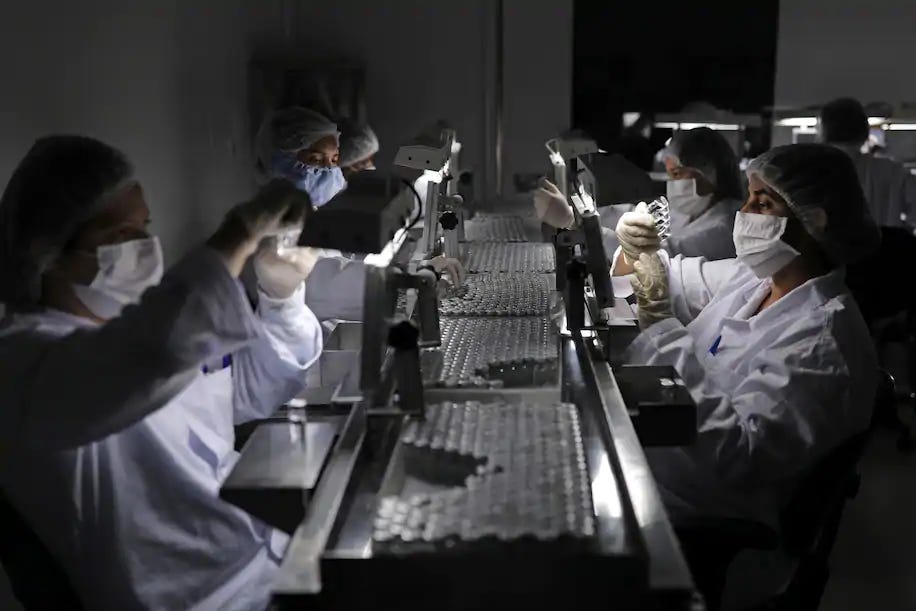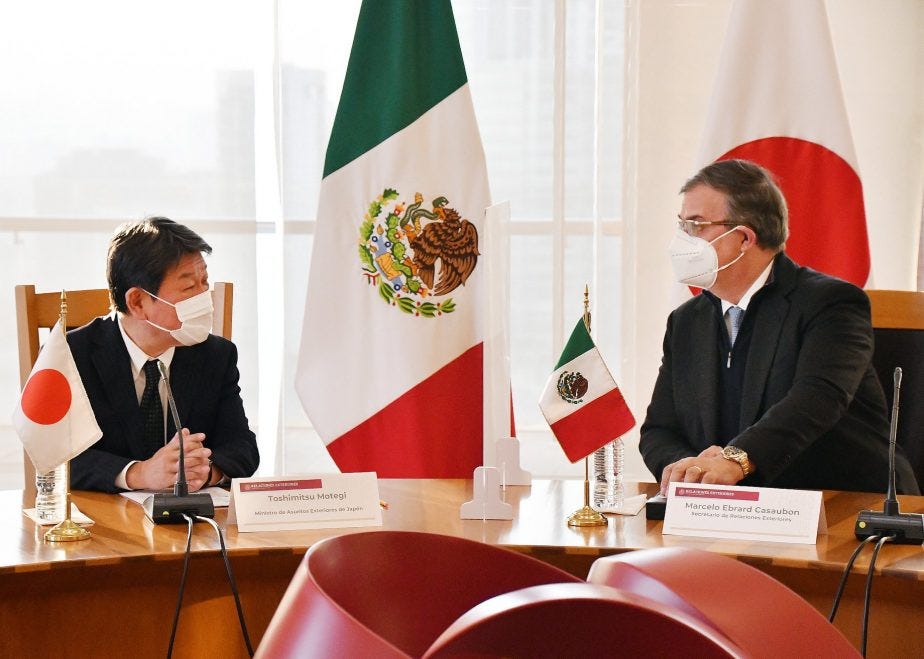The China Signal - January 15
Vaccine politics, more BYD electric buses to Bogotá, and loans to Ecuador
G’day, and welcome to The China Signal! This week, China’s Coronavac reputation plummets as it becomes further entangled in Brazil’s domestic political rivalries; Chinese private electric vehicle company BYD wins another major contract for Colombia’s electric bus fleet; the US government’s International Development Finance Corporation steps in to alleviate a chunk of Ecuador’s Chinese debt burden, as Ecuador also secures a $50mm credit line for pandemic recovery from the Chinese-led multilateral the Asian Infrastructure Investment Bank and the World Bank. Plus more.
Thanks to everyone who has signed up this week, and it was really valuable to connect with some of you to chat further. Please continue to reach out with me to share your views, and please share with others who might find this resource valuable.
Vaccine Politics
Brazil
Covid-19 doesn’t care about Brazil’s politics, and this week public pressure and the state of the pandemic pushed Brazilian President Jair Bolsonaro to reverse his resistance to purchasing China’s Coronavac. His resistance formed part of his broader anti-China stance, and a counter to his political rival João Doria, the governor of Sao Paulo. This is a pragmatic change forced by Brazil’s proliferating covid-19 burden, not a change in heart towards China by Bolsonaro.
Brazil Embraces Chinese Covid-19 Vaccine as Cases Soar - WSJ - January 8, 2021
Brazilian President Jair Bolsonaro’s administration has backed down from its criticism of Chinese vaccines and agreed to buy up to 100 million doses of a shot being developed by China’s Sinovac, as Latin America confronts a postholiday surge in Covid-19 cases.
The Health Ministry said late Thursday that it had signed a contract with the Butantan Institute, the São Paulo state research center that has been testing and producing CoronaVac, to buy 46 million doses. The ministry said it has the option to buy another 54 million, enough to immunize 50 million people with the two dose-shot, or about a quarter of Brazil’s population.
However, there’s a twist. After delaying the announcement for several weeks, on January 7 Sao Paulo’s Butantan Institute announced a 78% efficacy for Coronavac after Phase 3 testing. Yet on January 12, reports emerged that its efficacy was actually 50.4%. The original figure was misleading, accounting only for Coronavac efficacy in preventing severe cases. This is a serious blow to China’s “vaccine diplomacy” throughout Latin America and beyond, raising questions of transparency.

Chinese Covid-19 Vaccine Far Less Effective Than Initially Touted in Brazil - WSJ - January 12, 2021
While Sinovac’s CoronaVac efficacy rate still meets the 50% threshold the World Health Organization considers good enough for widespread use, scientists said a lack of transparency about the data risks damaging the credibility of a vaccine Brazilians and others world-wide are already reluctant to take.
But after rising pressure from Brazilian scientists, some of whom accused the trial’s organizers of misleading the public, Butantan said Tuesday those rates only included volunteers who suffered mild to severe cases of Covid-19. When data from all volunteers was considered—including those who contracted “very mild” cases of Covid-19 and required no medical assistance—the total efficacy rate fell to 50.4%, Butantan said.
…Brazil has agreed to buy up to 100 million doses, and seven other Latin American countries have been in talks to obtain the vaccine.
Sinovac and Butantan had initially scheduled to reveal the efficacy rate by Dec. 15 but delayed it a week, citing a decision to collect additional data. A week later, the announcement was delayed again, which Brazilian researchers attributed to Sinovac’s request for more time to consolidate data from trials in Indonesia and Turkey.
In Chile, officials said they would go ahead with plans to import some 10 million doses of the Sinovac vaccine, the first batch of which was expected this month, said Rodrigo Yáñez, a high-ranking official in the Foreign Relations Ministry in charge of importing the shots.
CoronaVac’s relatively low efficacy rate means more people will need to take the vaccine to achieve herd immunity, making it even more important for its developers to be transparent and reassure the public about its efficacy and safety, doctors said.
Infectious disease specialists blamed the skewed results on both pressure from São Paulo’s government and Sinovac in China.
Political observers here say that São Paulo’s Gov. João Doria, who spearheaded Butantan’s partnership with Sinovac, has politicized the vaccine’s development by championing its use in his increasingly public tussle with President Jair Bolsonaro, who has long disparaged Chinese vaccines. Mr. Doria is considered a likely presidential candidate next year.
Naturally, Bolsonaro has gloated in recent days when commenting on Coronavac’s disappointing efficacy, saying in effect, “I told you so”.
Deals and Investments
Colombia
BYD Wins the Largest Pure-Electric Bus Order outside of China | Business Wire - January 11, 2021
BYD is proud to announce that it has exclusively won cumulative orders to supply 1,002-unit pure-electric buses to the capital of Colombia, Bogotá.
This batch of buses is scheduled to be delivered during 2021 and into the first half of 2022, and will be put into operation on 34 bus routes across five regions of the capital…
…BYD entered the Colombian market in 2012… [and] has a market share of over 96.5% in the Colombian electric bus market, and… 99% in Bogota.
As Lisa Viscidi of the Inter-American Dialogue notes in a recent New York Times Op-Ed, China is the top seller of electric buses and other clean technologies to the region. She argues that the incoming Biden Administration should increase clean tech exports and financing as part of a broader engagement strategy with Latin America. Brookings also echoed this call in a recent report.
Ecuador
The US International Development Finance Corporation has struck a deal to help Ecuador repay billions of dollars in loans to China in exchange for excluding Chinese companies from its telecom networks.
One of the main conditions of the deal with Ecuador is that Quito signs up to what the Trump administration calls “The Clean Network” — a state department initiative designed to ensure that nations exclude Chinese telecoms services and equipment providers as they build out their high-speed 5G mobile networks.
Under the agreement, the DFC will team up with private-sector financial institutions to help create a special purchase vehicle that will buy oil and infrastructure assets in Ecuador. The sale of the assets will provide Quito with cash to pay off the debt to China earlier than previously agreed — $3.5bn will be outstanding after an upcoming repayment is made to Beijing — and also provide money to pump into various development projects.
Ecuador’s presidential election will be held on February 7. Moreno isn’t running fo re-election. One of the front-runners is economist Andrés Arauz, who is backed by former leftist president Rafael Correa. An Arauz victory could see Ecuador again turn away from the United States, and return to a more pro-China stance.
And this, from December:
Ecuador obtains credit line to face Covid-19 fallout - Leaders League - December 15, 2020
Ecuador has successfully secured a $50 million credit line from the World Bank and the Asian Infrastructure Investment Bank (AIIB) as part of its strategy for recovery from the Covid-19 crisis
The loan will be disbursed to Corporación Financiera Nacional, Ecuador’s largest public bank.
This project aims to develop and improve financial products, in order to provide private micro, small and medium enterprises (MSMEs) with access to finance. Such companies represent 99.5% of businesses in Ecuador, and many are facing liquidity constraints as a result of the Covid-19 crisis.
AIIB’s loan is expected to finance 350 smaller loans and 1,000 partial credit guarantees to eligible MSMEs associated with Asia-Ecuador trade.
Ecuador became the first Latin American member of the AIIB, a China-led multilateral bank, in 2019.
Full details on the financing can be found here.
Diplomacy
Broader Latin America
Japan Aims tor Greater Engagement in Latin America – The Diplomat - January 12, 2021

The new year for Japan began with another push in its strategy for greater engagement in Latin America, with recently appointed Japanese Foreign Minister Motegi Toshimitsu undertaking his first visits of the year to Mexico, Uruguay, Argentina, Paraguay, and Brazil. With one of the longest visits to Latin America by a Japanese foreign minister in recent times, Motegi’s visit is symbolic of Japan’s commitment to maintaining bilateral ties in the region as well as cooperating through multilateral initiatives such as the G-20 and Comprehensive and Progressive Agreement for Trans-Pacific Partnership (CPTPP).



